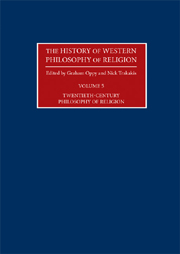Book contents
- Frontmatter
- Contents
- Editorial Introduction
- Contributors
- 1 Twentieth-Century Philosophy of Religion: An Introduction
- 2 William James
- 3 Henri Bergson
- 4 John Dewey
- 5 Alfred North Whitehead and Charles Hartshorne
- 6 Bertrand Russell
- 7 Max Scheler
- 8 Martin Buber
- 9 Jacques Maritain
- 10 Karl Jaspers
- 11 Paul Tillich
- 12 Karl Barth
- 13 Ludwig Wittgenstein
- 14 Martin Heidegger
- 15 Emmanuel Levinas
- 16 Simone Weil
- 17 A. J. Ayer
- 18 William P. Alston
- 19 John Hick
- 20 Mary Daly
- 21 Jacques Derrida
- 22 Alvin Plantinga
- 23 Richard Swinburne
- 24 Late-Twentieth-Century Atheism
- Chronology
- Bibliography
- Index
2 - William James
- Frontmatter
- Contents
- Editorial Introduction
- Contributors
- 1 Twentieth-Century Philosophy of Religion: An Introduction
- 2 William James
- 3 Henri Bergson
- 4 John Dewey
- 5 Alfred North Whitehead and Charles Hartshorne
- 6 Bertrand Russell
- 7 Max Scheler
- 8 Martin Buber
- 9 Jacques Maritain
- 10 Karl Jaspers
- 11 Paul Tillich
- 12 Karl Barth
- 13 Ludwig Wittgenstein
- 14 Martin Heidegger
- 15 Emmanuel Levinas
- 16 Simone Weil
- 17 A. J. Ayer
- 18 William P. Alston
- 19 John Hick
- 20 Mary Daly
- 21 Jacques Derrida
- 22 Alvin Plantinga
- 23 Richard Swinburne
- 24 Late-Twentieth-Century Atheism
- Chronology
- Bibliography
- Index
Summary
William James (1842–1910) had a peripatetic childhood in which his father, the theologian Henry James, Sr, hustled him and his four younger siblings, among whom was the novelist Henry James, Jr, from one European nation to another in search of an adequate education. After a brief stint as a painting student of William Morris Hunt he entered the Lawrence Scientific School at Harvard in 1861. On graduation in 1864 he enrolled in the Harvard Medical School, completing the MD degree in 1869, with a year off to participate in Louis Agassiz's research expedition to Brazil. After suffering serious ill health and depression from 1869 to 1872, he became an instructor in physiology at Harvard, where he spent his entire career until his retirement in 1907. He rapidly moved up the academic ladder, becoming an instructor in anatomy and physiology in 1873, assistant professor of physiology in 1876, assistant professor of philosophy in 1880 and full professor in 1885, and a professor of psychology in 1889.
The philosophy of William James was an attempt to heal a deep breach within himself. On one level it consisted in an apparent clash between his need to do science and his equally strong need to be religious and lead the morally strenuous life: to be, as he put it, both tough-minded and tender-minded. His pragmatism is advertised as giving us a way to do it all with a clear conscience, thereby serving as a reconciler or mediator, but not a unifier, of these different stances toward the world.
- Type
- Chapter
- Information
- The History of Western Philosophy of Religion , pp. 13 - 26Publisher: Acumen PublishingPrint publication year: 2009

